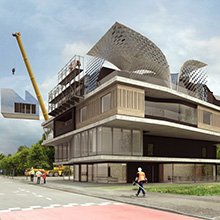Wings
Water and sanitation innovations for non-grid solutions – an inter- and transdisciplinary strategic research program

Wings strives to develop novel non-grid water and sanitation systems that can function as comparable alternatives to network-based systems. We do this by:
- Studying such systems from a variety of different perspectives (engineering, decision analysis, development studies, transition and innovation studies, and behavioral studies)
- Working in close collaboration with key stakeholders from different sectors and decision levels
- Pursuing research in different socio-economic contexts (research pillars), ranging from industrialized countries to emerging and developing countries
- Addressing conceptual and methodological issues that link and relate existing research projects in different contexts (transversal projects)
- Building on current and past research projects in the field of urban water management
Background
The management of urban water systems has been a core responsibility of civil society throughout history. This reflects the central importance of these systems for human welfare and environmental protection. The current conventional approach to urban water management builds on well-established socio-technical systems that have evolved over the last century and have solved most of the water- and hygiene-related problems afflicting OECD countries in the past. These predominantly centralized and networked systems reliably treat and provide drinking water and safely transport, treat, and dispose wastewater. Challenges are posed, however, by population growth (both increases and decreases), climate change, emerging contaminants, as well as by the need to rehabilitate and replace aging infrastructure.
Though there is still an ongoing debate whether there is a need for new approaches in OECD countries, leading research institutes, international organizations and national governments are increasingly acknowledging that the conventional approach to urban water management cannot be the only solution for rapidly expanding cities in low- and middle-income countries in Africa, Asia and Latin America. With centralized and networked urban water systems out of reach for a large part of the global urban population, there is an urgent need for developing fundamentally new approaches, i.e. more flexible, cost-effective, resource-efficient non-grid systems that are able to cope with current and future urban water challenges.
Team
Program team
SWW
ENG
Sandec
ESS
Research pillars and projects
We organize our research within four research pillars. Each pillar covers a typical socio-technical system configuration. The program builds on current and past research activities in the involved departments of Eawag and aims to add value to these projects.
Wings Disconnect
Wings Disconnect identifies the conditions for decentralized water systems in contexts with well-established governance structures, medium to high incomes and high degrees of centralization. Compared with the dominating approach of water supply and sewer networks, decentralized systems promise to respond more favorably to new requirements such as rapid demographic variation, climate change or other planning uncertainties. Additionally, there is a growing unease that it might not be financially sustainable to continue to maintain the existing aging pipe networks.
Wings Disconnect provides the scientific base for identifying whether system change towards non-grid-connected water and sanitation solutions could alleviate these concerns and improve the financial sustainability of urban water infrastructures. To do this, we elaborate where and when it is possible to disconnect from the centralized system and implement non-grid-connected systems (particularly small treatment plants) and identify potential infrastructure transition paths. This includes developing methods to determine the optimal degree of infrastructural centralization, quantify the performance of entire systems, identify industrial opportunities, and support decision-making over time.
Current Projects
Past Projects
Wings Hybrid
Wings Hybrid investigates new models and methods to recycle nutrients, water and energy in future cities, particularly within the context of climate change. Conventionally, mixed wastewater is separated and treated in centralized wastewater treatment plants. We aim to establish viable alternatives for full-scale applications that collect and treat the wastewater flows separately according to the type and concentration of their contaminants. By doing so, water, nutrients and energy can easily be recovered, thus increasing water and energy productivity.
Wings Hybrid develops further urine separation and treatment to reuse anthropogenic nutrients in agriculture, as well as greywater treatment, to regenerate water with high chemical and microbial quality. This includes technical development and optimization through practical trials in a living lab, implementation of demonstration projects and collaboration with industrial partners.
Current Projects
Past Projects
Wings Emerging
Wings Emerging explores innovation in emerging markets characterized by rapid urbanization, an expanding middle-income population and overall economic growth, leading to rising living standards, increasing construction activities and growing resource demands (water, energy, services, etc.). Because of these particular characteristics, we assume that new urban development areas in emerging markets are among the most promising potential lead-markets for innovative non-grid-connected solutions that encompass water supply, wastewater treatment, waste disposal and energy supply in a holistic way.
Wings Emerging aims to inspire and support decision makers and niche players on how to transition towards such holistic solutions that allow for meeting growing demands while recovering resources. This includes analyzing the relevant capabilities necessary to succeed with such innovations, studying innovation paths to introduce non-grid-connected solutions and exploring barriers and drivers for their diffusion.
Current Projects
Wings Informal
Wings Informal analyzes non-grid solutions for some of the most intractable, complex and rapidly expanding built environments in the developing world: informal settlements. Residents of these areas are disadvantaged as they lack formal access to land, housing and basic urban services. Solutions will therefore have to build on sound technological approaches, while also meeting the specific needs and specific resource constraints that are found in this context.
Understanding the broader complexities of current, heterogeneous sanitation systems with particular focus on the interfaces between these systems is the aim of Wings Informal. This includes analyzing the enabling environments that support or hinder the successful introduction of these solutions, exploring the scaling conditions for business models with particular focus on container-based systems, and identifying the challenges and opportunities related to scaling innovations in informal settlements.
Current Projects
Past Projects
Wings Transversal
Transversal projects projects bundle conceptual and methodological needs of the pillars and/or the overall program. By doing so, they strengthen the connection within the interdisciplinary research team.
Current Projects
Publications
Urban Water Management
Inter- and Transdisciplinarity
Case Studies
Involved Departments
Wings informs twice a year about current projects and developments
Order newsletter
News
What do sustainable neighborhood planning, a urine fertilizer and a traditional Swiss Apéro have in common? The answer can be found in our new short film "Verhebets? A Resource-Oriented Apéro" about the potentials of a resource-oriented urban water management. The Global Science Film Festival has also now nominated the short film in the category "Best Short Film 2023".

The Wings Team published an inter- and transdisciplinary research agenda on the future of urban water management together with a group of international researchers.
Program Structure
































